Womanist Ethical
Rhetoric
Rhetoric, Race, and Religion
Series Editor : Andre E. Johnson, University of Memphis
This series will provide space for emerging, junior, or senior scholars engaged in research that studies rhetoric from a race or religion perspective. This will include studies contributing to our understanding of how rhetoric helps shape race and/or religion and how race and/or religion shapes rhetoric. In this series, scholars seek to examine phenomenon from either a historical or contemporary perspective. Moreover, we are interested in how race and religion discourse function rhetorically.
Recent Titles in This Series
Rhetorics of Race and Religion on the Christian Right: Barack Obama and the War on Terror
By Samuel P. Perry
Rhetoric, Race, Religion, and the Charleston Shootings: Was Blind But Now I See
By Sean Patrick ORourke and Melody Lehn
Rhetoric and the Responsibility to and for Language: Speaking of Evil
By Matthew Boedy
The Struggle over Black Lives Matter and All Lives Matter
By Amanda Nell Edgar and Andre E. Johnson
Desegregation and the Rhetorical Fight for African American Citizenship Rights
By Sally F. Paulson
Contemporary Christian Culture: Messages, Missions, and Dilemmas
Edited by Omotayo Banjo Adesagba and Kesha Morant Williams
The Motif of Hope in African American Preaching during Slavery and the Post-Civil War Era: Theres a Bright Side Somewhere
By Wayne E. Croft
The Womanist Preacher: Proclaiming Womanist Rhetoric from the Pulpit
By Kimberly P. Johnson
Women Bishops and Rhetorics of Shalom: A Whole Peace
By Leland G. Spencer
What Movies Teach about Race: Exceptionalism, Erasure, and Entitlement
By Roslyn M. Satchel
Womanist Ethical Rhetoric: A Call for Liberation and Social Justice in Turbulent Times
Edited by Annette D. Madlock and Cerise L. Glenn
In honor of the Rev. Dr. Katie Geneva Cannon (19502018)
Katie Geneva Cannon was the first African American woman ordained in the United Presbyterian Church (USA), and her work focused on the areas of Christian ethics, Womanist theology, and women in religion and society. She lectured nationally on theological and ethical topics. She was the author or editor of numerous articles and seven books, including Katies Canon: Womanism and the Soul of the Black Community and Black Womanist Ethics.

Cerise dedicates this book to her mother, Jo Linda Parham Glenn (19522018). Your legacy continues to live on in the work of the lives you have touched. We love and miss you. Annette dedicates this book to the following women as their work and dedication to their families and communities speaks to our lived experiences and exemplifies a womanist ethic of liberation and Black feminist thought: Dr. Melbourne S. Cummings, Carla Bradford, Rev. Dr. Alika P. Galloway, Gwen Ifill, Carolyn Madlock, Danna Madlock, and Dr. Denise Dunbar-Perkins.
Womanist Ethical Rhetoric
A Call for Liberation and Social
Justice in Turbulent Times
Edited by
Annette D. Madlock
and Cerise L. Glenn
LEXINGTON BOOKS
Lanham Boulder New York London
Published by Lexington Books
An imprint of The Rowman & Littlefield Publishing Group, Inc.
4501 Forbes Boulevard, Suite 200, Lanham, Maryland 20706
www.rowman.com
6 Tinworth Street, London SE11 5AL, United Kingdom
Copyright 2021 by The Rowman & Littlefield Publishing Group, Inc.
All rights reserved . No part of this book may be reproduced in any form or by any electronic or mechanical means, including information storage and retrieval systems, without written permission from the publisher, except by a reviewer who may quote passages in a review.
British Library Cataloguing in Publication Information Available
Library of Congress Cataloging-in-Publication Data
Names: Madlock, Annette D., editor. | Glenn, Cerise L., 1977, editor.
Title: Womanist ethical rhetoric : a call for liberation and social justice in turbulent times / edited by Annette D. Madlock and Cerise L. Glenn.
Description: Lanham : Lexington Books, [2020] | Series: Rhetoric, race, and religion | Includes bibliographical references and index. | Summary: Womanist thought remains of critical importance given contemporary issues of social justice and advocacy. Womanist Ethical Rhetoric centers discourses of religious rhetoric and its influence on Black womens aims for voice, empowerment, and agency in these turbulent timesProvided by publisher.
Identifiers: LCCN 2020041917 (print) | LCCN 2020041918 (ebook) | ISBN 9781793613554 (cloth ; alk. paper) | ISBN 9781793613561 (ebook)
Subjects: LCSH: Womanism. | Womanist theology. | Social justice. | Women, BlackSocial conditions.
Classification: LCC HQ1197 .W659 2020 (print) | LCC HQ1197 (ebook) | DDC 305.48/896073dc23
LC record available at https://lccn.loc.gov/2020041917
LC ebook record available at https://lccn.loc.gov/2020041918
 The paper used in this publication meets the minimum requirements of American National Standard for Information SciencesPermanence of Paper for Printed Library Materials, ANSI/NISO Z39.48-1992.
The paper used in this publication meets the minimum requirements of American National Standard for Information SciencesPermanence of Paper for Printed Library Materials, ANSI/NISO Z39.48-1992.
Contents
Cerise L. Glenn and Annette D. Madlock
Annette D. Madlock
Kimberly P. Johnson
Cerise L. Glenn
Kami J. Anderson
Michelle Meggs
Natonya Listach and Andre E. Johnson
Tracy Coquette Bass and Michelle Rhnea Yisrael
Annette D. Madlock and Cerise L. Glenn
Some of us have people in our lives with whom we share and discuss our ideas; Dr. Andre E. Johnson is one of those people for me. As I shared my ideas about social justice, womanist rhetoric, and Black feminist thought, Dr. Johnson extended to me the opportunity to be a part of the Rhetoric Race and Religion series (R3). Thank you, Andre, for listening and supporting me along the way as you have done for so many others. After further contemplation, I decided on an edited collection to include the voices of other scholar-activists. I invited Dr. Cerise L. Glenn to work with me on the collection as a coeditor. We both come to the project committed to social activism, womanism, and black feminist perspectives. When you have an idea for a project, it takes a community to make it all come together, and this is an opportunity for me to thank those who contributed to making this project happen.
That community includes the scholars who participated in the following panel: Womanist Rhetorical Theory and Criticism for the African American Rhetoric and Public Address (AARPA) Pre-Conference at the 2019 National Communication Association conference: Ayo Morton, Kimberly P. Johnson, Tiffany J. Bell, Dianna Watkins-Dickerson, and Toniesha L. Taylor. We had an excellent exchange of ideas regarding the application of womanist and black feminist thought from diverse perspectives to various contexts.
Communicating for survival was the theme for both the 2019 National Communication Association convention and the Religious Communication Association conference, which allowed me to continue on the womanist path by organizing, presenting, and responding to the following conference panels: Communication for survival: Wheres the beloved community? , Social justice, religion, and the 21st-century church , and a Womanist ethic of liberation and social justice in the current political climate from academics to organizational leadership . Thank you, Kami J. Anderson, Christopher House, Christopher Underation, and the panelists from the AARPA preconference. The exchange of ideas during these well-attended panels created additional opportunities for sharing womanist scholarship.

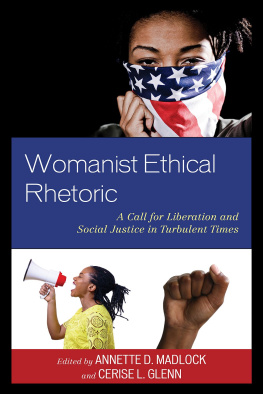

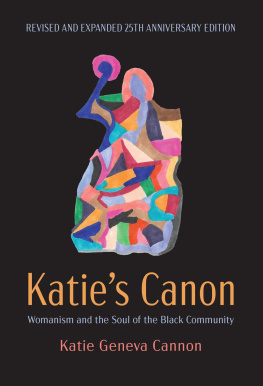
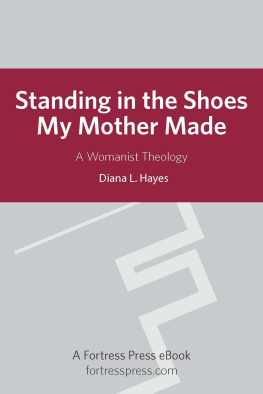
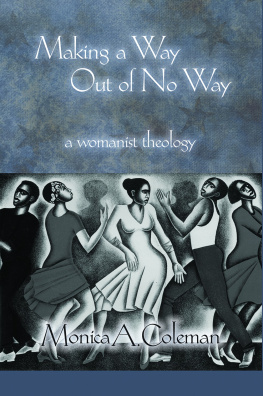
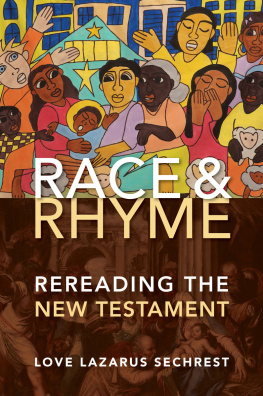
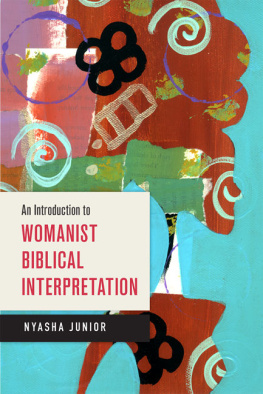
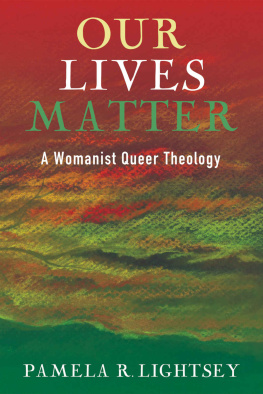
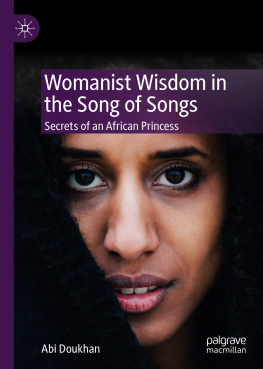
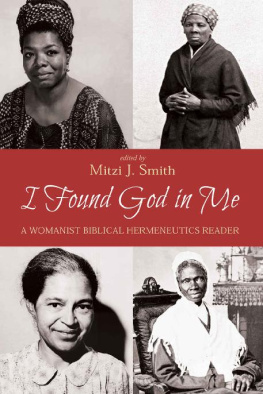


 The paper used in this publication meets the minimum requirements of American National Standard for Information SciencesPermanence of Paper for Printed Library Materials, ANSI/NISO Z39.48-1992.
The paper used in this publication meets the minimum requirements of American National Standard for Information SciencesPermanence of Paper for Printed Library Materials, ANSI/NISO Z39.48-1992.